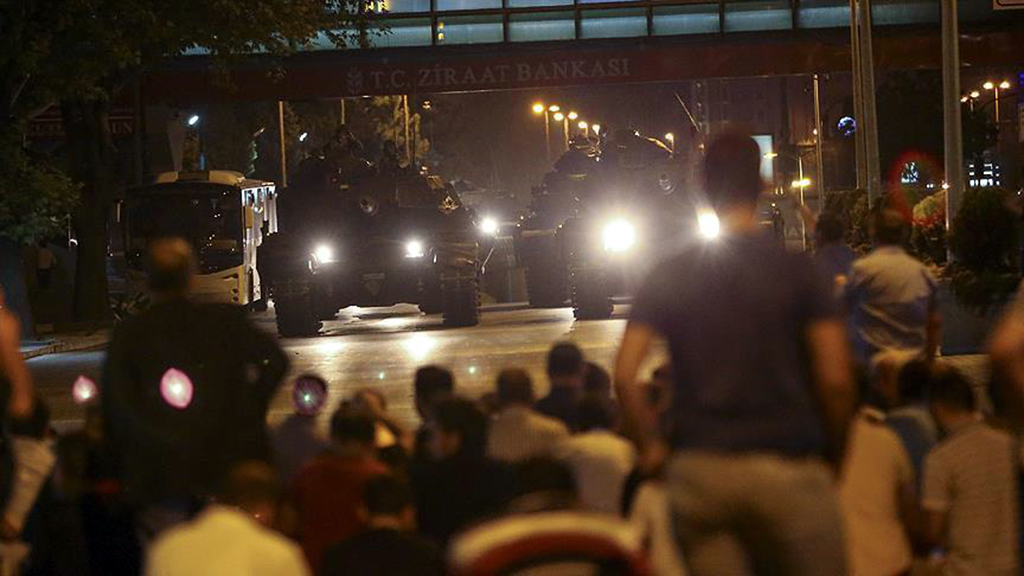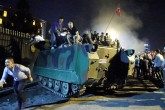On July 15, Turkey commemorated the third anniversary of the heinous coup attempt by members of the Gülenist Terror Group (FETÖ) and their affiliates who were nested within the Turkish state apparatus. A total 251 Turkish citizens were martyred and more than 2,000 citizens were injured during their struggle to push back the coup.
Turkish people demonstrated solidarity and stood strong to defend democracy and Turkey’s integrity against the foreign influences that are affiliated with FETÖ. Turkish people understood the dynamics of the coup and FETÖ and provided strong support for the government to struggle against the FETÖ threat. FETÖ had operations in more than 150 countries before the coup and even today they are still active in more than 100 countries. The struggle against FETÖ should be a global struggle to be more effective. One of the obstacles Turkey faces today is explaining the FETÖ threat to its friends in an international context.
Some international actors portray President Recep Tayyip Erdoğan and his party either as “authoritarian” or as “Islamic extremist” due to his critical stance in the international arena against the mainstream global order.
Some countries really have difficulties understanding the extent of the FETÖ threat. The outcome of this misunderstanding – whether bias against the president or Turkey’s inability to convince its international counterparts led to the weakening of Turkey’s global struggle against FETÖ.
What made this network organize patiently for 40 years to attempt a military coup to topple the democratically elected government in Turkey? How can they attract bright minds all over the world to work as teachers in their global school network? What motivates this clandestine network that has ties to all sectors in Turkey?
In particular, Western audiences, elites and policymakers have difficulties understanding the nature of the FETÖ threat. It is very difficult to comprehend such a deep and complicated threat in an open society that has a democratic order.
Turkish official institutions, the Turkish Presidency, Ministry of Foreign Affairs and many others including civil society institutions such as the Foundation for Political, Economic and Social Research (SETA) struggle to explain FETÖ to Turkey’s global counterparts. Last week, we participated in a conference, Charting the Way Forward: Humanitarian Crises and Instability in the Middle East, organized by the NATO Association of Canada, the Royal Canadian Military Institute and SETA Washington, D.C. Emine Nur Günay, Kadir Üstün, the executive director of SETA D.C. and myself presented Turkey’s struggle against FETÖ and the country’s contributions to the relief of humanitarian crises in the region.
Important opinion makers participated in the event and asked detailed questions about FETÖ. Such occasions allow us to provide explanations about FETÖ. Many of our counterparts confessed that they were exposed more to FETÖ narratives about July 15, 2016, and they appreciated our efforts to counter the hostile narrative.
FETÖ is a new generation extremist organization, and it is a transnational network, which used to operate in more than 150 countries. Hundreds of thousands of people in hundreds of countries have gone through their training.
Many of them are still loyal to this organization, and they still believe in the messianic views that the organization and its leader Fetullah Gülen spread. There are splits in the lower ranks of the organization that constitute the majority in terms of numbers, but they are lower in the ranks of FETÖ.
F-16 pilots, generals, cybersecurity experts and counterterrorism police, intelligence officials, judges, public prosecutors and even diplomats were among the ranks of the Gülen network. Many of those people today are either imprisoned or fugitives; they are very dangerous, and they may be ready to collaborate with any other terrorist group in the world. Turkish police and intelligence still reveal scores of active duty officials and bureaucrats that are connected to the FETÖ network almost every month. Even this demonstrates the complexity of the threat.
Rather than Turkish laws, those people got their orders from their “spiritual guides” or “abis” (elder brothers) from the Gülen network. Those orders from the network take precedence over Turkish law. This is not just a significant threat to Turkey but to all other countries where the network operates. This was also a significant gap in the chain of command in the military, police and bureaucracy because even a sergeant in the higher ranks of the FETÖ network could give an order to a colonel or a general if he is lower in the ranks of the organization.
If the colonel does not comply with the FETÖ orders he could be punished. The same situation is relevant for the bureaucracy and even in the business networks or academia that are related to the FETÖ network.
The hierarchy of the FETÖ network is above all other hierarchies. The followers of the network have been conditioned and trained for 40 years to comply with the orders and be loyal to the network. That is how some of those people jumped the ranks of the military, bureaucracy and academia. Turkey gained some immunity against this organization, which was quite costly, but other countries do not have such immunity at the moment.
The real danger is not in the critical skills of FETÖ members but in their messianic belief system, which was formulated by Gülen, and can be manipulated easily for any purpose. We have to keep in mind that this coup was organized over 40 years with strategic patience. Both the leader and top-level disciples of this movement believe that they are chosen people to accomplish a special mission and to change the world.
Even after the failure of the coup attempt, many loyal members and believers in the network continue to believe that there is a special message in this, and “We have to continue our mission despite difficulties, our mission and goals are right.” It is quite impossible to defeat the creed of the network.
FETÖ is still very active in almost 100 countries. They have access to economic resources but more importantly to young, smart people whose lives may be ruined by the FETÖ ideology. The messianic mission and vision of Gülen encompasses the entire world and the idea behind this movement may be more long-lasting than the idea behind Daesh.
We know that it is very difficult to explain FETÖ to our friends in internationals environments because it is very complicated and an “illogical” phenomenon. To have a society and political system based on reason, the rule of law and democratic values, Turkey expects solidarity and cooperation with its international counterparts. It should be a strategic priority for Turkey to explain the FETÖ threat in a more elaborate way in the global arena in the coming months.
[Daily Sabah, 18 July 2019]



